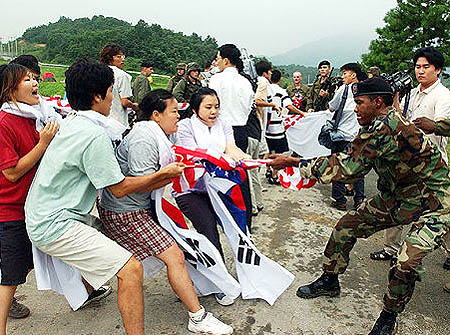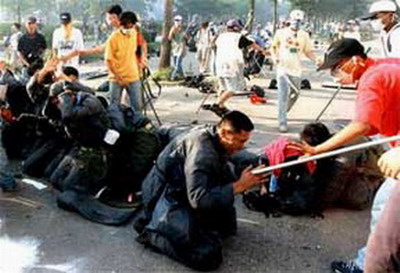All of a sudden, I have found out that I was living in a leftist country. Every time I go to gym and hit the treadmill I see that every news channel covering the current UPP feud all day along. As one of those who think that SK needs to realign its general political stance a bit to the left, should I praise this abrupt national attention? I’m not just being sarcastic but, in a manner, I do mean it. All the news outlet are shedding HID Xenon light on those who were at the edge of the SK politics just a few weeks ago. Only worse than being hated is being neglected. Today’s discordance might lead the public into a recognition of progressive politicians at last–at least they’ve got a spotlight now.
So was the most hopeful view of mine concerning the feud until I finally learned about what the non-factioners are struggling against. The Gyeonggi Dongbu Alliance was, in fact, more than a run-to-the-mill splinter group, as which I simply thought of them before I knew their origin, history and culture. It is the dregs of the history of the SK democratization activism unleashed after all.
I began my higher education in the early 2000s, when student activism, which had been playing key role in the history of the SK democratization activism since the 80s, was seriously weakened in the wake of new millennium. At least formally the country was democratized with the advent of the Sixth Republic and right after that people seemed to be losing interest with student activism–even student themselves. Student activists were virtually extinct in my alma mater in the era when I entered. Freedom fighters for democracy, rallying off a campus and throwing pieces of broken precast paves and vases–an activist slang for Molotovs–to the police, were like dinosaurs to me.
The student activism scene of South Korea would be roughly divided into the two major lines: National Liberation and People’s Democracy. It is not my aim to elaborate on the difference between them and neither am I able to. But in brief, NL puts national–one of the peculiarities of the SK mentality is that it isn’t possible to distinguish between what is national and what is racial–issue ahead of everything and has a strict militaristic–no questions, doubts to orders from above–hierarchy, while PD underlines class conflict in every social problem and is relatively open to debate.
More in detail and reality, NL sees the US as the root of the fundamental social contradiction of SK, who colonized SK politically, culturally, economically, militarily. Thus, in order to remedy the problem, we should oust the empire from the peninsula to achieve self-reliance. Such a hostility towards the US couldn’t gain popularity until the Gwangju Democratization Movement broke out in May 18th, 1980. The connivance of the US that let Chun Doo-hwan government massacre the innocent citizens of Gwangju infuriated the nation. A lot of people who had a friendly view to the US turn themselves against it. A series of arson attacks and sit-in protests in the US culture centers among the cities of Gwangju, Busan, Daegu and Seoul showed the rise of the new hatred as well. From the 80s and through the decline of the PD line after the downfall of the Soviet Union, the NL line remained as the major force of the student activism in SK.

Given that the anti-American agenda was the top priority, they had an ally that was also a role model: the North. Although the NL liners were very enormous in not only its size but its breadth hence they weren’t so monomorphous in its philosophy, a lot from those who were in the leadership were following the Juche ideology and even allegedly took orders, since there is only a single legitimate revolutionary government according to the Juche idea, from the North.
This specific part of the history later raises the so-called pro-North issues numerous times by the conservative news outlets, especially the Chosun. Based on part fact and part their wishful thinkingrather than fact, their own brand of McCarthyism proved itself to be effective still in the 21st century. But it is also undeniable that the NL’s eccentric, sometimes even bizarre organizational culture did lead itself into disintegration.
Thus had I understood so far but not knowing how exactly their culture was and why because they are dinosaurs to me. A recent series of articles on a populous baseball community written by a former NL activist shed light on what I couldn’t have known.
The forementioned series of memoirs, which had quite a buzz on the web and is going to be published as a book, tells us a long tale of how a student, self-confident and eager to change the world, turns into a part of a bureaucratic machine that forgot its avowed cause long ago and now operates only for its own survival. It is not my aim to simply sum up the memoir but to put it up with my own criticism so I will skip the details of the machine described in the memoir.
What is the machine to which I refer? In every moments of the social reforms, student activists were at the forefront. And student activists rely upon their school (which equals to university) for their support, be it financial or personnel. Hence the student council, from where money goes in and out, is what they are after above all. As I said, there are roughly two major faction, NL and PD, among the student activists and this is where the clash happens. Each faction would do anything as long as it’s going to bring a council to them. And here rises the machine: raised under the banner of revolution, struggles to survive, against the power repressing it, at all cost. After paying all the cost, it couldn’t be the same as it was at the beginning.
The first irony that newborn activists encounter is to see an organization for people’s democracy discarding its own democracy. Everything the student activists have to do is sent down from the above, higher echelon and there are always discussions about guidelines that came down but no dissents or doubts are allowed. You just don’t know what a discussion is or you are entrapped by revisionist, reformist ideas which divide the movement into pieces, if you keep insisting your opinion.
The movement is under repression of the government so it is necessary to operate the organization secretly, they argue. To demand an organization that runs with transparency and collects opinions from the below is too naive. (They would have liked Leo Strauss a lot though I don’t think they would had had a chance to read–they were too busy to read!) All the decision is made by the others, a cabal whose member is completely unknown to ordinary activists, not a chairman or officials. From this, the separation of decision and responsibility, one of the most peculiar aspects of the SK activism arises. To decide is for the ones, to be imprisoned is for the others. Thus, though lots of chairmen and officials of Hanchongryun were arrested and imprisoned, the organization didn’t stagger at all. Behind the pretty figureheads, e.g. Lee Jung-hee and Kim Jae-yon in the recent case, a cabal decides where to put these pawns.
To crowd the other factions out is not a sign of autocracy or lust for power but a necessity for a unified line of the movement, which is advisable. They do literally everything, including blackmail and rigging an election as they did with the UPP primary, to win a student council election and after winning the council, they marginalize the other factions and their agenda, labor or human rights issues. They just concentrate on their own autonomous interests and demands.
What about the ordinary, non-activist students’ demands and issues? What they think their own demands are, in fact, not their own but resulted by distorted, superficial thoughts from the outside. Actually they don’t know what they really want and it is our duty to struggle for what they ought to want. (Again, Leo Strauss smiles!)
A young, enthusiastic activist is soon to confront this kind of contradictions. She sees what she believes to be just is in conflict with what the organization does and demands. She has been often disillusioned for what she already saw but fellow activists’ enthusiasm and sacrifices kept her going on. Now she stands on the edge, witnessing a huge rupture of the road, and has to decide–to withdraw or to take a leap of faith. The road to our great cause is not flat, in regard to both logic and stability of life, and this wouldn’t be the last time even if she has been in a similar situation several times before. Each time she takes a leap of faith, gradually she is getting away from where the ordinary people is living in.

Although the excessively violent protests in the late 90s weakened its status and sympathies from the public, the machine ran perfectly well, at the expense of the lives of the activists. Burdened with hectic schedules from the above, student activists had to sacrifice all their life for the officialbusiness: rallying, council activities, meetings and recruiting freshmen. There is no room for reflection and study even though they are students in fact. As ones who couldn’t handle them anymore leave, burdens weigh more on the shoulder of those who are left . Those who remain the last are the ones who took the leaps the most, who were hurt and broken the worst.

[quote cite=”source (no longer remains now)” url=”http://mlbpark.donga.com/mlbpark/b.php?&b=bullpen&id=858236″]The day an activist confronts her own reality will come in any moment after all. Times have changed. They sway back and forth, between being legal and illegal, a mass organization and a cabal. There is always a serious situation going on when one is inside the faction but outside it, a whole different world lies behind. However, it is hard to see the reality and accept errors; it is a total denial of her youth. So she tries to fill the holes in her mind with a form of a life of an activist until she finds out that she is not able to fill them anymore, then she leaves the movement. [/quote]
The case of the student activists is not an exception of the organizational problem, one of the major problems SK has. Which is also ruining corporations’ productivity and creativity. SKoreans work the longest in the world and its strictly inflexible organizational cultures are one of the main obstructions of its development into a knowledge based economy. What we are witnessing in the current UPP feud is its result a long time coming in politics. More crises like this, not only political but also economic or social, will be approaching henceforth and our future will be brightened or darkened, depending on how we deal with the issues. Indeed, time will set things right after all but I’m not sure if I can see them set right alive.

Leave a Reply